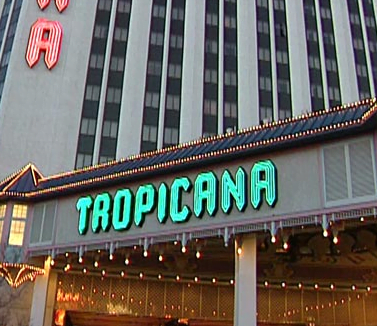Tropicana Entertainment is poised as the first major casino company to emerge from Chapter 11 bankruptcy later this month after nearly 2 years of restructuring and negotiations. The company’s debt has been discharged and Tropicana’s new owner, Carl Icahn is infusing the company with $150 million to pay creditors and upgrade casino properties.
The corporation’s drop into bankruptcy traces back to former owner Bill Yung’s pricey, boom-era gamble in 2007 – the purchase of Aztar casino chain, which saddled it with $2.7 billion in debt the same year the economy started its downturn…The company suffered a major blow in December 2007 when New Jersey regulators revoked its license to operate the Tropicana in Atlantic City, forcing the sale of one of its largest and most profitable assets… Net operating revenue grew 77 percent in 2007 after the Aztar acquisition. But expenses rose 210 percent, resulting in a net loss of $1 billion. A big chunk of that went to interest payments on the company’s mammoth debt. Tropicana Entertainment entered bankruptcy with debts about equal to its $2.8 billion in assets.
Tropicana’s CEO Scott Butera said that he saw the bankruptcy as an opportunity and beamed about its positive impact on the company’s profits.
“This word, bankruptcy, frightens people. But it’s been incredibly beneficial for us,” Tropicana Entertainment CEO Scott Butera says.
Even while still in bankruptcy, Tropicana is on track to generate about $700 million in cash per year and that’s with a very low debt obligation. Many casino companies are trying to avoid bankruptcy at all costs because of the perceived negative stigma of filing bankruptcy amongst those in the casino industry. However, Tropicana is proving that bankruptcy can work “miracles” even for companies that operate in industries that still harbor animosity towards bankruptcy.
Also, many casinos are struggling financially due to the recession with very high debt loads. Those casinos will be hard pressed to compete against a company like Tropicana who has used bankruptcy to reduce debt and increase profits.
